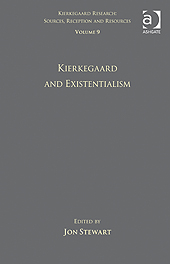
Kierkegaard Research: Sources,
Reception and Resources
|
||


 |
||

|
The term “existentialism” has traditionally been notoriously
difficult to define due to the fact that the label has been
attached to the work of so many different thinkers with such
diverse agendas. However, there can be no doubt that most of the
thinkers who are usually associated with the existentialist
tradition, for whatever their actual doctrines, were in one way
or another influenced by the writings of Kierkegaard.
Table of
Contents
Reviews
"...this
volume is a rich resource for Kierkegaard scholars. There have been other
essays on Kierkegaard in relation to many of these thinkers, but the great
merit of this volume is the way it collects thorough, detailed, and up-to-date
studies of Kierkegaard’s influence on these thinkers, as well as bibliographic
information on the relevant scholarship....Consequently, this volume (like this
series) will serve as the ideal first stop for researchers seeking to
understand Kierkegaard in relation to other major philosophical, theological,
and literary figures." "Overall,
this book is a wonderful addition to the work already completed in the Kierkegaard
Research: Sources, Reception and Resources series. It is certainly a
fantastic research tool to have when working on the reception of Kierkegaard’s
thought among the existentialists. To this end, one of its greatest elements
are the bibliographies found at the end of each essay; together these provide a
plethora of further resources in a number of languages which highlight the
references to (and uses of) Kierkegaard in each philosopher’s oeuvre, the
sources of each thinker’s knowledge of Kierkegaard, as well as the relevant
secondary literature treating Kierkegaard’s relation to each given
figure." "This
book provides an excellent starting point for researchers looking to situate
Kierkegaard with other thinkers commonly labeled as 'existentialists.' " "The
book as a whole contains much information on the genesis of Existentialism and
on Kierkegaard's role in it."
|
Kierkegard’s International
Reception
Kierkegaard’s Influence on Existentialism Kierkegaard’s Influence on Theology
Kierkegaard’s Influence on Philosophy
Kierkegaard’s
Influence on Literature and Criticism
Kierkegaard’s
Influence on the Social Sciences Kierkegaard’s Influence on Social-Political Thought
|
|
The
series Kierkegaard Research: Sources,
Reception and Resources is published Routledge Research, Philosophy
Routledge / Taylor & Francis Group, 711 Third Ave., Eighth Floor, New York, NY 10017, USA
|
||

